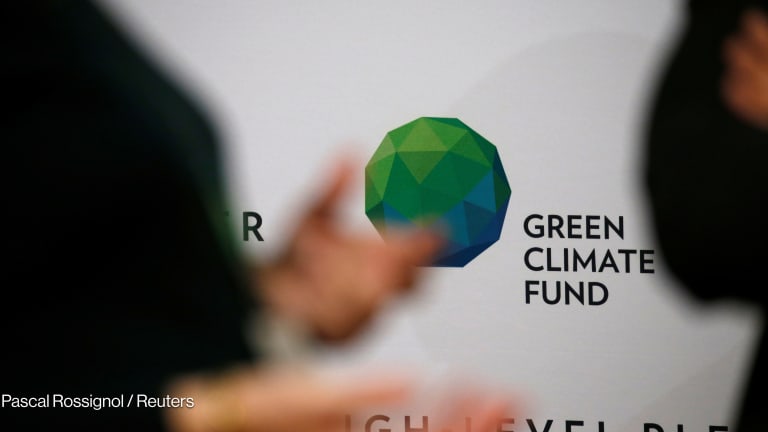
MANILA — Three months after a breakdown of its last board meeting, the world’s largest international climate fund seems to have its house in order. The United Nations’ Green Climate Fund kick-started a process to replenish its dwindling finances and approved over a billion dollars’ worth of projects to help developing countries adapt to and mitigate the effects of climate change.
These decisions were made during a four-day board meeting in Bahrain that ended Oct. 20.
“Many of the positive results from [the board meeting] will set the right tone for the Conference of the Parties to keep on providing consistent and progressive guidance to our board,” Javier Manzanares, the deputy executive director of GCF, told Devex.
Catch up on the Green Climate Fund:
► Q&A: Behind the breakdown at UN's Green Climate Fund
► The Green Climate Fund commits billions, but falls short on disbursements
The 19 projects approved range from $10 million for an energy efficient consumption loan program in Mongolia with the country’s XacBank, to over $43 million for a project in India to enhance the climate resilience of its coastal communities with the U.N. Development Programme. Several of the projects put forward, particularly the large-scale ones, were controversial for political and/or technical reasons.
Chief among them was a request for a $180 million loan to catalyze climate finance in China’s Shandong province and a proposal for roughly $10 million in grant money for water conservation efforts in Bahrain to be conducted by the country’s National Oil and Gas Authority.
In the case of Bahrain, which is eligible to apply for GCF funds, some argued that it is rich enough and doesn’t need scarce GCF money. Furthermore, some board members and civil society organizations challenged the merit of the project, which Bahrain argues is necessary to deal with the serious water issues that it faces, which are predicted to worsen with climate change.
An independent panel, however, labeled its climate rationale as “weak.” The proposal also suggests that if the funds are approved, Bahrain will ask for more money to clean up wastewater from its oil and gas sector, drawing ire from watchdogs.
“What’s worse is that because [the Bahrain project] had an implicit promise for a second phase funding, we saw it as a potential for supporting continued fossil fuel exploration by dealing with the wastewater sector,” said Liane Schalatek, associate director of the Heinrich Böll Foundation North America who was present at the board meeting. The project, which was originally presented to the secretariat as a roughly $40 million proposal was ultimately approved for just a little over $2 million.
China, in its first request for GCF funds, also stirred controversy. Its proposed project aimed to drastically reduce the use of dirty energy in a province with the highest consumption of coal per capita — while China itself is the world’s biggest producer of greenhouse gases.
As such, the proposal received strong support from developing country board members who noted that it was the kind of “transformational” measure the fund should support and which would benefit from south-south learning. But the United States board member Mathew Haarsager blocked the project’s approval, saying he was concerned about the possible use of funds for the research and development of commercial products and unsure about the mechanism for environmental disclosure.
“This is very political and nothing else,” said Meena Raman, climate change coordinator for the Malaysia-based nonprofit, Third World Network, and a long-time follower of GCF proceedings. “The fund is another victim of U.S. politics.”
Apart from the political element, civil society organizations shared some of Haarsager’s concerns. “[The project] leaves many details, especially about overall governance and related accountability and transparency structures as well as the determination of subprojects to be determined at a future time and under the sole oversight of the accredited entity,” Heinrich Böll’s Schalatek said at the Bahrain meeting on behalf of the CSOs present, adding that the proposal was “far from ready for board approval.”
Ultimately, the project was deferred — a rare, but not unprecedented occurrence.
Contention surrounding the projects presented at the meeting further highlights the need for a formal voting system in the absence of consensus. Currently, each board member has veto power, which has created gridlock in the past. But board members couldn’t agree on the proposal for a voting mechanism put forward by the co-chairs at the meeting. Still, GCF’s Manzanares says he’s “confident” the board will agree on a decision-making process ahead of its next board meeting in February 2019.
Moving forward, the main focus is on replenishment. While the international climate change community can finally celebrate the board’s decision to take this critical step, there are many questions left unanswered: What is the overall time frame? Will the funding target be needs based? What will be the contributor policies?
Admittedly, it is still early on in the process, but with the U.S. and Australian governments clearly stating that they will not contribute any more money to the fund, the stakes are higher than ever. As GCF’s Manzanares puts it: “The true exciting times are coming now.”








